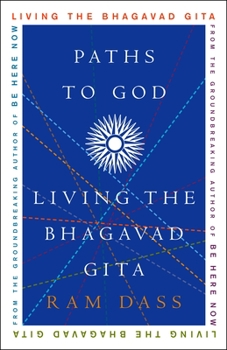Paths to God: Living the Bhagavad Gita
Select Format
Select Condition 
Book Overview
World-renowned philosopher and spiritual teacher Ram Dass--author of the groundbreaking classic Be Here Now --presents the contemporary Western audience with a lively, accessible guide to the teachings of the Bhagavad Gita, the classic Hindu text that has been called the ultimate instruction manual for living a spiritual life.
Format:Paperback
Language:English
ISBN:B000XUDGJY
ISBN13:9781400054039
Release Date:October 2005
Publisher:Harmony
Length:352 Pages
Weight:0.70 lbs.
Dimensions:1.0" x 5.3" x 7.9"
Customer Reviews
5 ratings
The Greatest Commentary Ever Written on the Gita
Published by Thriftbooks.com User , 15 years ago
Throughout the ages, some very powerful commentaries on the Bhagavad Gita have been written by some of India's greatest sages: Shankara, Aurobindo, Vivekananda, and even Gandhi himself, the Mahatma, the "great spirit." Be that as it may, the greatest commentary yet written on the Gita is "Paths to God" by Ram Dass. Now, I grant you, Ram Dass stands on the shoulders of giants, of course. Baba Ram had the nonreciprocal privilege of reading the commentaries of his predecessors. And it's true, Baba Ram had many more advantages over these other giants of Hindu thought: A doctoral education from Stanford, scientific training as a Clinical Psychologist, and hundreds of experiences with tryptamine psychotropics. Nevertheless, Dass deserves credit for his ingenuity and originality in rendering an ancient and esoteric text relevant and lucid. The great key to spirituality is the same in all exoteric religions and wisdom traditions. Christ says "not my will but Thine be done." Christianity is very much about surrender to the Divine Will. So it is with Islam. The very word Islam means submission or surrender to God. In Judaism, the Torah is full of heroes who put the will of God above their own desires, perhaps the most notable example being Abraham, who is willing to kill his own beloved son, Isaac, at the Lord's command (this bears notable similarity to what is being asked of Arjuna in the Gita.) Taoism, too, teaches "non action" and "effortless effort." This is quite similar to St. Paul's statement of "I no longer live, but Christ lives in me." In Buddhism, the Buddha is said to have said, "Paradoxical though it may sound: There is a path to walk on, there is walking being done, but there is no traveler. There are deeds being done, but there is no doer." This is the heart of the Bhagavad Gita: deeds without a doer. In "The Perennial Philosophy," Huxley says that "The last end of man, the ultimate reason for human existence, is unitive knowledge of the divine Ground-knowledge that can come only to those who are prepared to `die to self' and so make room, as it were, for God." When we surrender our puny, private little wills to the Universal Will of the Divine Absolute, the numinous Ground of All Being, then it is as though we are not living; it is as though God/Brahman/The Tao is LIVING us. (Do you recall Jerry Garcia's quip about the songs having played the band?) This is one of the most important tenets of Hinduism: there are two selves. The ego is the small self, the contracted self, the illusory self. This self is called the jivan. Then there is the Universal self, the Transpersonal Self. This self is called the atman. The atman is made of the same soul-stuff as the spirit of the Universe itself, Brahman, the Divine Ground of All Being. It is only the illusion of separateness that isolates one from unity with God. For, as William Law said, "Nothing hath separated us from God but our own will, or rather our own will is our separation from God
Another Great Book
Published by Thriftbooks.com User , 19 years ago
I have been a student of the Gita for several years. I was so pleased by this book. Ram Dass takes the philosophy of the Gita down to a personal level-to the level of living one's spirituality which is what the Gita is for. Great book!
A classic in modern form....
Published by Thriftbooks.com User , 19 years ago
Written with typical Ram Dass humor and brilliance, Paths To God: Living the Bhagavad Gita helps to bring light and clarity to this classic yogic text. I have always struggled to understand philosophy, and the Bhagavad Gita was a challenge for me to get through. But with this book as a companion, I feel that I can access the wisdom of the Gita a little easier. This book is very accessible for not only Westerners, but for anyone who is looking for a fresh perspective on the Gita. I especially like the Syllabus at the end that includes exercises which allow one to integrate the lessons of the Gita into daily life. I feel more open to the wisdom that the Gita offers. It truly is a "manual for living a spiritual life".
A Book to read and reread.
Published by Thriftbooks.com User , 19 years ago
I found this book in the local Yoga Studio Center and couldn't put it down. I have attended many Ram Dass workshops at Esalen and around the Bay Area over the years. This book is just like listening to Ram Dass in person. It is such a gift to go back to that time in Naropa and hear his wisdom. What a comforting and wise writer. Peller Marion, Ed.D. author of Shopping Lessons, Career Tune Up and Searching for the G Spot
Quintessential Ram Dass
Published by Thriftbooks.com User , 20 years ago
Wow, lovely material. Inspiring and entertaining. Ram Dass makes it real. The esoteric teachings that can sometimes baffle yet are so rich with life lessons. Worth the read. Would consider this a book to own and refer to again and again.





